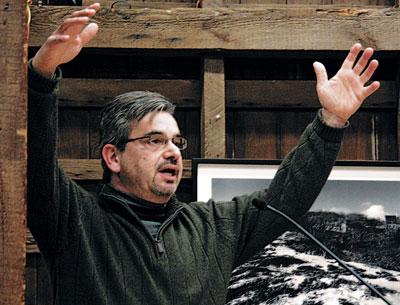Hotel Might Hurdle Bar Obstacle

The Beach House, Montauk’s season-old seasonal resort, appeared to have weathered a storm at an East Hampton Town Zoning Board of Appeals hearing on Tuesday night. Under a court precedent cited by its attorney, Andy Hammer, it may turn out to be the first of a new wave of motels and hotels throughout the town allowed to have expanded accessory uses, including bars open to people who are not guests. The Beach House itself, however, may still face another obstacle.
Tuesday’s hearing was on an appeal by the resort’s owners, Chris Jones and Lawrence Siedlick, challenging a determination last July by the town’s head building inspector, Tom Preiato. Mr. Preiato ruled that its poolside bar, which serves the general public, required site plan approval from the town planning board as well as a building permit, neither of which had been obtained. In Mr. Preiato’s opinion, the bar was a pre-existing, nonconforming use that was limited to the hotel’s guests. He also found that the conversion of a shed on the property to a gift shop, also without permits, was an illegal expansion.
The Beach House is allowed to provide transient accommodations, even though they do not conform to the area’s zoning, because the former motel there, the Ronjo, pre-existed the code. The code requires overall site plan review of any expansion. In addition to the question of whether the bar being open to the public for drinks last summer constituted an expansion; live music and D.J.s were on hand.
In a presentation, Mr. Hammer threw the town code into question by citing two New York State Appellate Court decisions. In Gauthier v. the Village of Larchmont, a decision dated July 8, 1968, upheld a lower court decision that a hotel in Larchmont, similar in status to the Beach House as a pre-existing, nonconforming business, could not be prevented from opening a bar to serve the public. The court held that was not an expansion of use, stating, “Clearly, the service of liquor refreshment is inseparable from a modern hotel and as a matter of law a bar therein is an accessory use.”
The second case cited by Mr. Hammer, dated March 28, 1950, appears to cover the shed now being run as a Beach House gift shop. The decision, in 140 Riverside Drive v. Murdock, states, Mr. Hammer said, that a hotel is entitled to run a “candy, tobacco, and newspaper counter” as an accessory to its operation.
Mr. Hammer also said that Section 1184 of the town code recognizes a bar or gift shop as an accessory hotel use. “That has always been in the code,” he said.
Toward the end of the hour-and-a-half hearing, Mr. Jones addressed the board. The shed, which was partly reconstructed last year, is barely big enough to step into, he said, and sells amenities and gift items.
“If you saw the revenue that came out of the store last year, I don’t think it would qualify as a hobby,” he said, meaning that it was not a separate entity.
Mr. Hammer, when asked after the hearing if the case law cited meant that any hotel in town could open a bar, said each case would be different and other elements would have to be considered.
Mr. Preiato was also at the hearing. Quizzed about whether the bar and gift shop should have triggered overall site plan review, Mr. Preiato stood by his July determination that they should have. Mr. Hammer responded that the case law he had cited contradicted Mr. Preiato’s opinion.
One point that all the participants in the hearing seemed to agree on was that the bar and gift shop had required building permits.
“While the bar may be sound, that has to be demonstrated to me,” Mr. Preiato said.
“Were these afterthoughts?” Sharon McCobb, one of the panel’s members, asked Mr. Jones. “Tom Preiato made a point that these [structures] weren’t on the original plans,” she said.
“We genuinely apologize for that,” Mr. Jones said. “When we purchased the property, we had such a behemoth project,” he said, with applications to the architectural review board as well as the planning board necessary before the Beach House could open last year in time for the summer season.
While a favorable ruling from the board would mean the Beach House did not have to undergo overall site plan review with regard to the bar and gift shop, such review could nevertheless be required by what has been called the “private club” aspect of the business.
The Beach House advertises a private beach and pool club on its Web site. Among the benefits promised members are discounted room reservations, 120 canopy beds, and discounted daytime food and beverages.
Under the town code, a private club is a defined as owned and operated by a not-for-profit organization, however.
Whether the Beach House’s private club is a separate, expanded use, is “an issue that needs to be looked at by the Building Department,” Robert Connelly, the Z.B.A.’s attorney, said. If so, overall site plan review would be necessary.
The Z.B.A. is expected to render its decision within the next 62 days.
